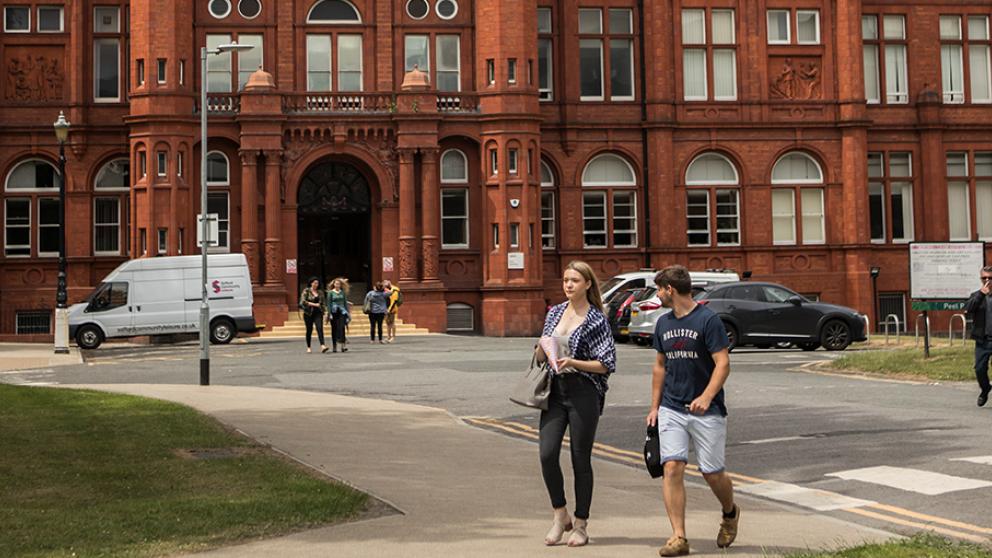University of Salford’s social mobility role recognised by two new reports

The significant role that the University of Salford plays in driving social mobility in Salford, Greater Manchester and beyond has been recognised in two major new reports published this month.
The University has partnered with the Social Mobility Pledge, an organisation co-founded in 2018 by education secretary Rt Hon Justine Greening and UK entrepreneur David Harrison, which works to encourage businesses and universities to play a fuller, more strategic role in creating opportunities and helping to level up Britain.
It has unveiled its Opportunity Action Plan to increase opportunity for its students and ensure clear and structured routes into higher education for all communities. The plan sets out the ambitions that Salford will work towards with the aim of extending opportunity to the hardest to reach in society and also building on its work to equip industry with skilled graduates.
The report highlights the University of Salford’s industry-focused approach to education. This includes working with employers to provide students with real world experiences, developing the curriculum to be in line with industry best practice and creating new routes into higher education through apprenticeships and higher technical qualifications.
Rt Hon Justine Greening said: “Levelling up is a national challenge - that’s why I’m delighted to be partnering with vice-chancellor Professor Helen Marshall and the University of Salford on producing this Opportunity Action Plan. It’s crucial work by the university, not only for the region but for the wider country.
“What Salford shows is that universities are at the heart of not only extending the chance for under-represented communities to get into higher education, but also in the push to then provide real choice that allows students to blend academic and vocational learning alongside honing their career-ready and entrepreneurial skills. It means they can take advantage of the many new careers in those emerging economic sectors whether in digital and tech, or in sustainability and the green economy that Salford is itself forging its own expertise in.
“By publishing this action plan, Salford is showing both best practice and real leadership on the levelling up agenda and I hope many others will follow them.”
To celebrate the launch of the University of Salford Opportunity Action Plan, the university held a roundtable discussion to explore how education and industry can work closer together to drive social mobility.
Joining university vice-chancellor Professor Helen Marshall and Justine Greening to explore how greater collaboration between industry, education and local government can drive social mobility were: Greater Manchester MP and member of the education select committee, Christian Wakeford; Justin Kelly, a senior director at Siemens and alumni of the University of Salford; another alumni and current scholarship sponsor Jim Sumner; and Cllr Sean Fielding, the Greater Manchester lead for skills, employment and apprenticeships.
Cllr Fielding said: “It’s been great to hear all about how the University of Salford is playing its part in driving social mobility in Greater Manchester. It has one of the most progressive outlooks on higher education I’ve come across and we’re proud to have the University in our city region. We have bold ambitions for Greater Manchester to be the best place to grow up and get on, and providing high quality education and training opportunities, like those available at the University of Salford, is critical to that.
“The University of Salford’s industry-focused approach gives students real world experience that sets them up for the world of work and prepares them for the industries of tomorrow. By opening up access to higher education and then opening doors to future careers, the University of Salford is making a real difference to the lives of young people across Greater Manchester and contributing to the economic success of our city region.”
The launch of the University’s Social Mobility Pledge report comes after the institution was ranked 14th in England for social mobility.
A new index to measure universities’ contribution to social mobility has been devised by the Higher Education Policy Institute (HEPI) and London Southbank University. The ranking system takes account both of the numbers of affected students and their ‘distance travelled’ using existing data such as the Index of Multiple Deprivation.
Professor Helen Marshall, vice-chancellor at the University of Salford, said: “As a civic university, we are committed to improving social mobility for young people in Salford and Greater Manchester, as well as delivering on the government’s levelling up agenda.
“Whether you’re training to be a nurse, engineer, or graphic designer, studying accountancy, biochemistry or fine art, education provides the keys to unlock the doors of opportunity. And at the University of Salford, we see our mission as helping our students to throw open those doors as wide as they will go to help them achieve their potential.
“And we’re very clear about how we do this. We work with industry to provide our students with a real world education that not only teaches them the knowledge needed to succeed in their future careers, but gives them the hands on experiences that will set them up for life.”
For all press office enquiries please email communications@salford.ac.uk.
Share:
